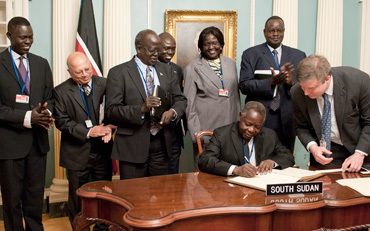EXCLUSIVE: South Sudan economy on the verge of collapse, World Bank warns
May 6, 2012 (WASHINGTON) – The newly independent state of South Sudan is quickly headed towards an economic cliff in light of its decision to shut down oil production which went into effect earlier this year, says a confidential report by the World Bank.

Following a bitter row over how much Juba should pay Khartoum for the service, South Sudan made a unilateral decision to suspend oil production in response to Sudan’s seizure of a portion of the exported oil to make up for what it says are unpaid transit fees.
South Sudanese officials insisted that even though oil exports constitutes 98% of Juba’s revenue, they are capable of surviving until an alternative pipeline is built. They also stress that just as much as the people of South Sudan were able to live through a long and devastating civil war with the north they could manage few years of economic hardships.
But a briefing by a senior World Bank official on March 1 obtained by Sudan Tribune paints a very bleak picture of what awaits South Sudan’s economy in the months ahead.
“[T]he World Bank has never seen a situation as dramatic as the one faced by South Sudan,” the World Bank’s Director of Economic Policy and Poverty Reduction Programs for Africa Marcelo Giugale is quoted as telling representatives of the major donor groups including the United States, United Kingdom, European Union (EU), Norway and the International Monetary Fund (IMF) among others.
The same presentation was given to the top officials in South Sudan on February 29, 2012.
Giugale told the donors that neither South Sudan president Salva Kiir nor senior member of his cabinet “were aware of the economic implications of the [oil] shutdown”.
According to the transcript, the World Bank official “candidly said that the decision was shocking and that officials present had not internalized nor understood the consequences of the decision”.
South Sudan is a unique and unprecedented situation globally, Giugale said because “countries in crisis usually face a collapse in growth rather than of GDP”.
As a result of a “sharp” drop in influx of hard currency and once citizens in South Sudan realize that value of their local currency is slipping “there will be a run for the dollars and families with dollars will almost certainly shift them outside the country”.
Giugale pointed out that because most South Sudanese are not fully financial literate the run on the point has not yet happened.
“Once it starts, the currency will almost certainly collapse,” Giugale says.
The World Bank official went on to analyse the situation of South Sudan’s foreign reserves and it is estimated that even with austerity measures adopted by the government in Juba, depletion of reserves can occur by next July “at which point state collapse becomes a real possibility”.
If South Sudan takes the drastic measure of cutting monthly spending by 77%, the reserves can only last until December 2013.
The social impact of the oil shutdown is no less daunting as Giugale points out. The percentage of population in living in poverty will jump from 51% in 2012 to 83% in 2013. In gross numbers 3.6 million more people will fall below the poverty line.
Under-five child mortality will double from 10% live births in 2012 to 20% in 2013 and school enrollment will drop from 50% to 20% over the same time period.
Giugale also dismissed arguments made by South Sudanese officials that a large percentage of the population will be immune from the impact because it is not part of the cash economy.
“Even the poorest households interact with the cash economy during the three-five month hunger gap through some form of trade, usually livestock. The terms of trade for livestock (goats and cattle) will depreciate sharply against imported staple food commodities pushing millions of households out of the market and deepening food insecurity. This is likely to occur at the height of the planting and harvest season, with profound implications for the next two-three productive cycles” Giugale says.
NO VIABLE ALTERNATIVE
The options before South Sudan are very limited and include implementation of severe austerity measures and establishing social safety net programs.
Even if Juba were to triple non-oil revenue as they project its impact will be “negligible” the World Bank official says.
Giugale stated that the World Bank analysis might help speed up reforms within South Sudan’s civil service that were otherwise not possible. But he cautioned that an economic collapse “could result in social and political fragmentation, unrest and instability”.
The G-6 donors group reacted to the World Bank finding by issuing a warning to South Sudan government that they are not prepared to fill the fiscal gap and as the situation continues they will not support the programs asked for by Juba.
“We anticipate a reorientation of our programs to protect the vulnerable, focused on life saving interventions. We cannot additionally implement the aid strategies that have been agreed upon,” the donors said.
South Sudan is urged by the donors to resolve the current standoff with Khartoum over the oil exports in order to build its institutions and capacity.
The United Nations Security Council (UNSC) on Wednesday ordered Sudan and South Sudan to return to negotiations within two weeks and resolve several issues including oil within four months.
Any side that fails to comply or cooperate with mediation could face sanctions, according to the UNSC resolution.
(ST)
